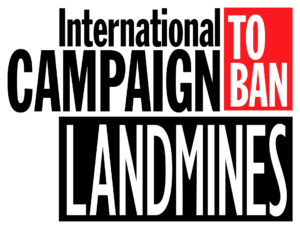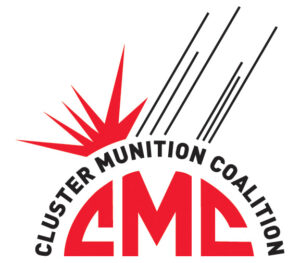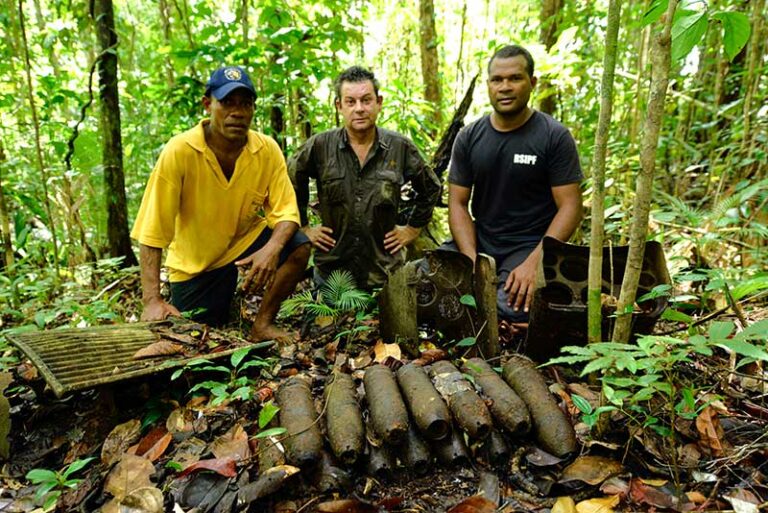About SafeGround
SAFEGROUND
WHAT WE DO
SafeGround is an Australian, volunteer-run, not-for-profit humanitarian organisation that works to minimise the impacts of weapons of war, in particular legacy weapons such as explosive remnants of war (ERW), landmines and cluster munitions, and emerging weapons – notably autonomous weapons.
Our projects focus on preventing harm caused by weapons through promoting international treaties and on the ground in countries and communities affected by unexploded ordinance. We work with affected communities, governments, and NGOs, both in Australia and overseas.
We advocate the eradication of indiscriminate legacy weapons such as landmines, cluster bombs and nuclear weapons that continue to maim and kill civilians long after the fighting of a war has ended. We also research Lethal Autonomous Weapons (LAWS), popularly known as “Killer Robots”, which are design to identify and attack targets without human involvement.
OUR VISION
SafeGround’s vision is for a world without war and conflict; a world where governments and communities:
Act in accordance with international humanitarian law and abide by the Universal Declaration of Human Rights;
Prevent the use of landmines, cluster munitions and other indiscriminate munitions;
Openly engage in dialogue pertaining to the elimination of indiscriminate weapon systems;
Oppose and remove indiscriminate weapons that impede development and cause suffering;
Actively apply diplomatic and non-violent prevention and resolution strategies to address conflict and war;
Respect and abide by international arms control treaties;
Respect and implement the rule of law, ensuring public accountability and transparency.
OUR ENDEAVOURS
Promote universalisation of the Mine Ban Treaty and the Convention on Cluster Munitions;
Promote risk education, victim assistance and clearance of contaminated land of ERW throughout the Pacific;
Keep well informed about the humanitarian consequences of developing military technologies;
Raise awareness of the humanitarian consequences of emerging autonomy in the military and increasing autonomous weapons
Promote the establishment of a legally binding instrument to address autonomous weapons, and Australia’s role in supporting this;
Oppose the use of any weapons that cause an unacceptable level of civilian harm and suffering;
Work towards the eradication of legacy weapons and prevent the use of unacceptable emerging weapons;
Promote the adoption of a treaty to ban the use of nuclear weapons.
OUR HISTORY
 The Beginning: the Australian Network to Ban Landmines
The Beginning: the Australian Network to Ban Landmines
The Australian movement for a ban on landmines began in the early 1990s. The clear aim of the International Campaign to Ban Landmines, including the Australian Network, was to achieve a global ban on landmines. Although this was seen by many detractors to be an unachievable goal, a small group of international NGOs actively campaigned to bring this about and in 1993 a group of Australian NGOs raised funds for an Australian Coordinator to develop a campaign to convince the Australian Government and solicit widespread public support.
Sister Patricia Pak Poy, a Sister of Mercy, became the first Coordinator of IBCL-AN and, under her leadership, the organisation was instrumental in changing Australian Government policy. In 1995, ICBL-AN launched a petition calling for a total ban on anti-personnel landmines and this was presented to government representatives with a total of 219,000 signatures, with an additional 25,000 signatures added by the end of 1995.
1997 Mine Ban Treaty
On 18 September 1997, the Convention on the Prohibition of the Use, Stockpiling, Production and Transfer of Anti-Personnel Mines (also referred to as the “Mine Ban Treaty”) and on their Destruction became a reality. The treaty entered into force on 1 March 1999, and in that same year Sister Patricia and current SafeGround National Committee members John Rodsted and Mette Eliseussen were part of the ICBL Nobel Peace Prize winning team, which was recognised for its leading role in bringing about this historic document.
ICBL-AN activities in these early years included:
- raising funds for mine clearance and victim assistance
- attendance at all Meetings of States Parties to the Mine Ban Convention
- holding public awareness events
- lobbying the Australian Government to join the Mine Ban Treaty
- lobbying other governments to help achieve the ultimate goal of universalisation of the treaty
Supporting demining efforts in the Pacific region
The principal vehicle for interaction with these governments was the South East Asia Program (SEAP), which was a collaborative venture between the Australian Government, through the auspices of AusAID and the Australian Network To Ban Landmines, supporting coordinated regional efforts on landmines, including universalisation of the Mine Ban Treaty.
In 2003 and 2004, SEAP-funded projects included publication of a book of photographs by John Rodsted on the impact of mines and unexploded ordnance in Laos, as well as an exhibition of the photos at the Fifth Meeting of States Parties. In April 2004, the government supported the Australian Network in its work to organise a regional workshop on landmines in Kunming, China, the first-ever such meeting held in China.
In 2005 agreement to proceed with a second phase of the SEAP program was reached with the government. The SEAP project worked to encourage those countries which had not signed the Mine Ban treaty to accede and for those countries which had only signed to fulfil the ratification requirements.

The campaign to ban Cluster Munitions
In 2006, John Rodsted travelled to Lebanon immediately after the Israel–Lebanon war. He and others documented first hand the tragic result of the four million cluster bombs that Israel had dropped on urban areas in Lebanon. The photos and reports assisted the Norwegian Government to advance discussions for a ban on cluster munitions.
ICBL-AN was an integral and active partner in the international civil society movement to bring about this ban. Former ICBL-AN National Coordinator, Mark Zirnsak, and then committee member, Kerryn Clarke, participated in international conferences that ultimately produced the Convention on Cluster Munitions.
Emulating the success of the ‘Mine Ban Bus’ tours in the United States that culminated in the Mine Ban Treaty, John Rodsted and Mette Eliseussen undertook a ‘Ban Bus’ tour of Europe, concluding in Geneva in time for the official signing of the cluster munitions convention. Everywhere they went they educated people on the inherent dangers of cluster munitions and promoted the treaty.
Adopted on 30 May 2008 in Dublin, Ireland, and signed on 3-4 December 2008 in Oslo, Norway, the Convention on Cluster Munitions (CCM) entered into force on 1 August 2010. In 2008 the Convention had 94 states committed to it’s aims, this has since grown to 100 States Parties and 19 signatories. Current SafeGround member John Heathers represented ICBL-AN at the treaty signing.
THE FUTURE FOR SAFEGROUND

Planned work
- A multi-year research program on World War II ERW contamination in the Pacific Island nations, culminating in the production of films, photographic exhibitions, country reports and a book.
- Supporting a research documentary on landmine victims amongst Burmese refugees in Thai refugee camps.
- Engaging more closely with like-minded organisations.
- Continued involvement with international campaigns.
OUR BOARD
SafeGround National Committee
SafeGround is run by a National Committee made up of dedicated volunteers with diverse skills and experience. We are a team of researchers, photographers, educators, Nobel Peace Prize winners, finance specialists, writers, students, and activists. Our researchers are experts, who have decades of experience researching landmines, cluster munitions, and other explosive remnants of war.
Our team is based in locations across Australia and internationally. We meet once a month by Skype or teleconference and conduct the majority of our day-to-day communication by email. Each year we hold a 2 day residential conference to plan campaign actions for the year ahead. Sometimes sub-committees work on a particular issue, always reporting to the National Committee where final decisions are made.
Mette Eliseussen lived and worked in Afghanistan for nearly 7 years. Here she was a witness to landmines maiming and killing Afghan children in particular and she became a passionate campaigner to ban landmines. She has been active in the International Campaign to Ban Landmines since 1992 and became a co-laureate of the 1997 Nobel Peace Prize.
Throughout her career, Mette has advocated against landmines, cluster munitions, nuclear weapons, and autonomous weapons systems, contributing to the establishment of three international treaties. She has done grassroot activism across USA, East-Europe, and Asia-Pacific region planning, executing and delivering hundreds of lectures, public events and lobbying.
Mette holds a bachelor degree in Sociology and Political Science from Oslo University. This background has helped her create strong research projects documenting the impact of war in many countries such as Cambodia, Lao PDR, Vietnam, Solomon Islands, and Palau.
Mette has designed, managed and evaluated projects on landmine awareness, early childhood development, public health, women’s literacy programs and micro credit for female entrepreneurs.
Mette is a wilderness guide and expedition leader in the Arctic, Antarctic, Pacific, Kimberley and the Great Barrier Reef. She is a first aid responder and was also an emotional first aid responder in the Trauma Intervention Program in the USA.
Now she focuses on risk education and building a survivor’s network in Pacific Island states. She is also engaged with indigenous Australians living on land impacted by militarisation.
Mette was born in Norway, and has lived on all continents in the world including Antarctica.
John Rodsted is a founding member of the Cluster Munitions Coalition Australia and SafeGround. He’s worked as a photographer, author, film maker, activist, parachute instructor and stuntman for 45 years. He has been a major contributor of stories of communities impacted by landmines and cluster munitions worldwide. As the official photographer to the International Campaign to Ban Landmines he’s put a human face to the issue since the early 1990’s. In this role he is part of the team awarded the Nobel Peace Prize in 1997, ICBL. John is instigator and author of numerous books on the legacies of war and SafeGrounds coordinator of their Pacific Projects.
His work has always covered communities at risk and this has had him working in some of the most war torn countries around the globe including Cambodia, Bosnia, Kosovo, Lebanon, Afghanistan, Sudan, Eritrea, East Timor and many more. He is an Adjunct Professor at Griffith University.
Matilda Byrne is the Campaign to Stop Killer Robots Coordinator for Australia. Current PhD candidate with RMIT University and graduate of Masters of International Relations at the University of Melbourne, Matilda has particular interest in security issues and how arms control and disarmament among other peaceful policy can combine with strategic policy. Having researched small arms and light weapons, Matilda was led to SafeGround’s work.
Gordon Stranger is the Public Officer & Climate Driven Migration Co-ordinator. His professional experience has been largely as a water resources / climate change specialist. As a former senior academic (Flinders Uni), he has been an Australian Academy of Science exchange fellow and author of several books.
John Heathers has had a lifelong interest in the use of explosives and weapons. John retired in 2003 after a 30 year engineering career with Telstra and joined SafeGround (formally the Australian Network to Ban Landmines and Cluster Munitions) in Sydney in 2004. Wishing to do something practical in retirement he worked with an NGO interested in ridding the world of landmines for 11 years, while over that time visiting minefields in a number of Asian countries.
Miriam Deprez is the SafeGround National Secretary. Miriam is a Meanjin/Brisbane-based photographer, journalist, and researcher who has been actively working with SafeGround since 2016 and is currently their national secretary. She holds a bachelors degree in photography and journalism, and is currently undertaking her PhD at Griffith University where she is researching the visual politics of military occupation. As a freelance journalist and photographer, she has reported from Europe, Russia, Southeast Asia, the Pacific Islands, rural Australia, and the Middle East, where she worked as an editor in Palestine. She also teaches journalism and analogue photography at Griffith.
Nicole Lamond is a National Committee Member. Nicole is a natural innovator and strategist with expertise in marketing, evaluating opportunities, NPD, innovation and sales, with strong financial modelling and analysis skills. She has been an active champion of Fair Trade since starting Universal Village in 1999, importing the first teas from Certified Fairtrade farms into Australia. In 2003 she was a founding board member of the Fair Trade Association of Australia and New Zealand. With a keen sense of the consumer market, Nicole has developed the Qi Tea brand into an Australian staple, giving Australians an organic, functional tea range that tastes great as well as supporting their desire to purchase ethically traded products. She exited this business in 2023.In 2016, she joined forces with Julie Hirsch to create and launch Eloments, the worlds first 100% natural vitamin tea, which launched early 2019 and won numerous innovation awards.Nicole now focuses on projects related to business and built environments for a better world.
Heather Faulkner is a National Committee Member. She is a film maker and former senior academic and researcher with over 30 years of international experience in photojournalism and documentary storytelling. Having been introduced to SafeGround in 2009, she has become active in the campaigns to eradicate explosive remnants of war, and to push for the regulation of lethal autonomous weapons. She joined SafeGround’s National Committee in 2019.
Jeanne Wills is a National Committee Member. Jeanne is a dedicated advocate for international development and disarmament. She graduated with a Bachelor of Arts (International Studies) from RMIT in 2021 and has been actively involved with SafeGround projects ever since. Jeanne initially joined the SafeGround team as a research intern on the ‘Support Survivors of War’ project, later transitioning to research and advocacy, focussed on explosive remnants of war contamination in the Pacific. Currently, she coordinates SafeGround’s Pacific regional Stop Killer Robots campaign, engaging Pacific Island nations on pressing issues of autonomous weapons and advocating for new international law to prohibit and regulate these emerging technologies. In addition to her work with SafeGround, she has worked with several NGOs with a humanitarian focus. In 2024, Jeanne will commence a Juris Doctor, looking to specialise in human rights or international law, which her work at SafeGround has inspired.